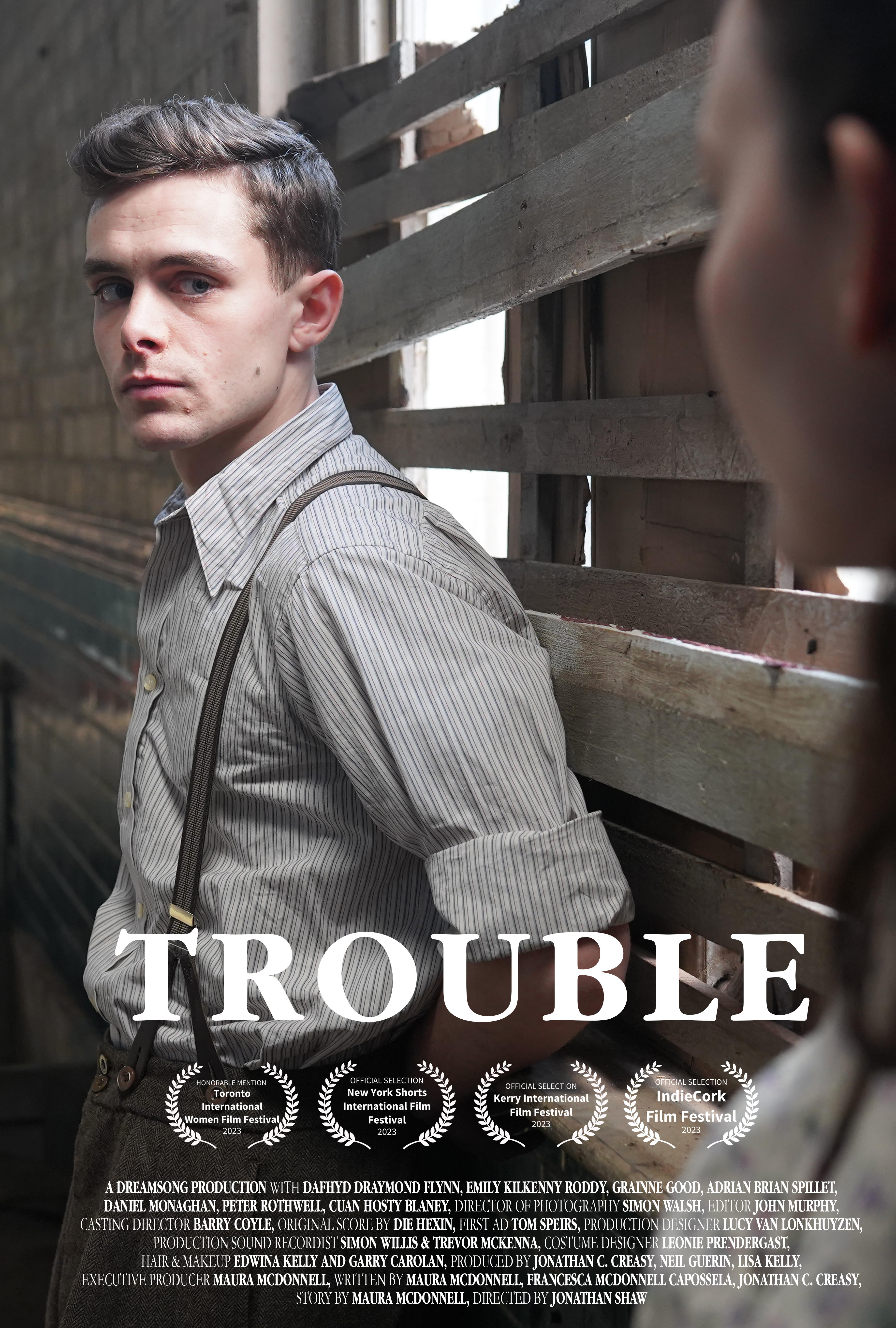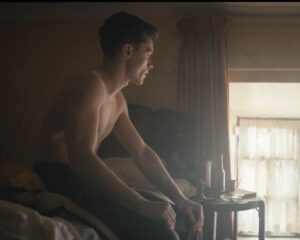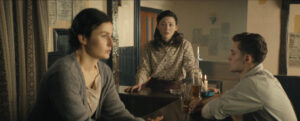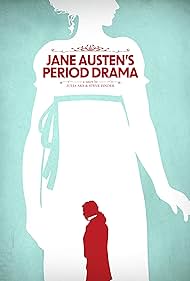
Short Film Review “Trouble”
NO TRAILER AVAILABLE CURRENTLY
First, the Recap:
At what cost freedom? This question seems to be one asked far to often throughout the course of history, as it comes in the face of overt adversity, loss, and desperation brought on by forces bent on having their own way, no matter what it takes. In the midst of such burden and uncertainty, there also remains the reliance on and protecting of who we are as individuals along with that of those closest to us, especially our own kin. When it’s already a trial being confronted and division begins to weigh heavily, how do you choose to move forward? It is 1922 Ireland, and it finds three siblings–eldest Rose (Emily Kilkenny Roddy), middle sister Alice (Gráinne Good), and brother Owen (Dafhyd Flynn)–buried in emerging secrets and inner pain as the first impacts of their beloved country’s Civil War have begun. Having suffered a recent hurt, things only go from bad to worse as they strive for unity in chaos while simply wanting life to return to as it was.
Next, my Mind:
It’s personal friction clashing with growing conflict and hard scrutiny of one’s conscious as it applies to thoughts of liberation, loyalties, and the desire to see normalcy again while choices revealing hidden truths will alter everyone involved forever, portrayed with raw, potent, compelling, heartbreaking emotional intensity and purpose through this 17-minute indie short film from the Emerald Isle, courtesy of director Jonathan Shaw, writer Francesca McDonnell Capossela, writer/producer Jonathan C. Creasy, writer/executive producer Maura McDonnell, plus producers Neil Guerin and Lisa Kelly. Putting an all-too-real portrait of the sheer horror of war in any form in play but placing its convincingly evocative context squarely in the perspective of three siblings who are already suffering as it is and now have their troubles compounded in a series of conversations that will usher forth further discord and questioning of all they know, it’s a based-on-true-events glimpse at what’s past in a manner that will unapologetically punch you in the face and leave the subsequent mark upon your mind and soul that it should.
The narrative that sees a family completely torn apart by the distress of loss which is still fresh and festering being beset by more inner and outer anguish, disagreement, discontent, building degrees of anxious tension, and revelations that will haunt them in more ways than they can even fathom much less see coming, it’s a study in the human condition in times of strife that is straightforward, blunt, and unambiguous, a lesson in underlying but ever-present and escalating anger, frustration, and hopelessness in what actions to take while wishing to rectify and reconcile in heart what is unfolding. But, the film also does an amazingly adept job and providing us moments of deeply stirring, heartening, and positive influence as well, though these instances don’t last. Ultimately, there is no happy ending to be found here by the film’s gut-wrenching finale, and yet it IS this magnitude of unease and blatantly harrowing atmosphere, subtle or otherwise, that gives the narrative its power and relevancy in cornerstone themes it chooses to address.
Additionally, explorations of concealed guilt, yearning for reconnection, attempting to mend broken familial relationships, the basic and evident bonds OF family, simply wanting peace, fractured mindsets, choosing sides, a fragmented sense of national pride, and the price paid for what we believe in and what we feel we MUST fight for is all found in the scope of the narrative’s runtime, and the fact that this all IS founded on real events in history only makes how it all pans out that much more necessary to be unflinching about it, for our history defines us and should never be forgotten, even when the events happening are ones we wish never had. Visually, the film carries a starkness to it that matches the tone it presents, allowing amounts of both conspicuous and conjecture-based imagery and sounds to form the required aura of edginess. Also, the film’s music score, from Die Hexen (who also composed for another film I reviewed recently, “Uroboros“), completes the ominousness air the story elicits with beautiful, eerily haunting effectiveness.
As with any story that has requisite need of dramatically impassioned (again, whether understated or evident) volatility, this critic is always impressed when actors can imbue their characters with this extent of it without overacting or making it appear forced. Suffice it to say, this primary trio succeeds to affecting measures in executing their performances wonderfully in this regard, beginning with Roddy through her role as Rose, the eldest of three siblings who are having to cope with the loss of someone close as it is, now a situation compounded by the start of a Civil War in Ireland and the consequential lockdown of their town. Having had her brother come back from being a prisoner of war, the secrets he carries from the experience soon get disclosed, much to Rose’s disconcert, as she makes every effort to keep the three of them together and sane in the face of utter brokenness and expanding disharmony.
It’s a nuanced performance filled with smartly offered energy and impactful vigor that both masks and divulges her shattered state of mind and longing to just be back to what once was and may never be again. Flynn excels here as well through his performance as the sole brother in the mix, Owen, who’s only recently come back from time spent as a prisoner of war. With not just the trauma of this but also weighted down by guilt over a particular choice he made that now comes to light, his urgency to support the cause he backs while still wishing to remain in the right frame of mind for his family becomes a point of contention between him and his sisters which will only lead to a place as of yet disclosed that could push his whole concept of events over the edge. I love how Flynn just exudes the fiery, embattled, contained-yet-ready-to-explode fervency the character has and the actor does so with a control and poise that not only befits Owen, but credibly to a “T”.
Finally, Good has the opportunity to portray what seems to be the only true ray of light in the darkness through her turn as Alice, the middle child of the three, who appears to possess an innocence in word and deed despite the broadening unsettledness they are all trying to stand up against. Only wanting to feel especially that her newly returned brother would be willing to confide in her like he has in the past while also just showing a curious and playfully calm, sisterly demeanor with Rose, it is Alice’s innate irreproachability that could cause her issues given a more “casual” viewpoint of the war at hand and how it will transform them all beyond what has already transpired. How Good presents Alice’s verity of intent is heartwarming and tragic at the same time, as we witness the character’s path with concern in how aware she is of the struggles at hand but perhaps not in the more cautious ways she should. It’s a dynamically moving performance given.
Additional turns are made by Daniel Monaghan, Adrian Brian Spillett, Peter Rothwell, and Cúán Hosty-Blaney. So, in total, “Trouble” is an acutely provocative, keenly poignant, intelligently profound dive into the specter of social, political, and personal upheaval that, in this case, also acts as a harbinger for what was yet to transpire in Ireland’s battle for national identity during later years beyond this initial internal splintering. It showcases the ghosts of wartime and the unforgiving harshness it heralds, hopefully making us ALL desire that animosity–personal, national, or worldwide–would become a thing that this film is a highly persuasive reminder of–the past. Ideally, may we discover HOPE for a BETTER reality than division and hate.
STAR RATING (out of 5):
As always, this is all for your consideration and comment. Until next time, thank you for reading!




